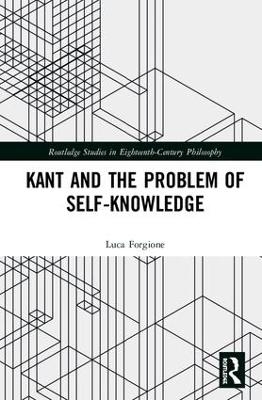
Kant and the Problem of Self-Knowledge
Seiten
2018
Routledge (Verlag)
978-1-138-38546-7 (ISBN)
Routledge (Verlag)
978-1-138-38546-7 (ISBN)
This book addresses the problem of self-knowledge in Kant’s philosophy. The author connects the relevant scholarly literature on Kant with contemporary debates on the huge philosophical field of self-knowledge.
This book addresses the problem of self-knowledge in Kant’s philosophy. As Kant writes in his major works of the critical period, it is due to the simple and empty representation ‘I think’ that the subject’s capacity for self-consciousness enables the subject to represent its own mental dimension. This book articulates Kant’s theory of self-knowledge on the basis of the following three philosophical problems: 1) a semantic problem regarding the type of reference of the representation ‘I’; 2) an epistemic problem regarding the type of knowledge relative to the thinking subject produced by the representation ‘I think’; and 3) a strictly metaphysical problem regarding the features assigned to the thinking subject’s nature. The author connects the relevant scholarly literature on Kant with contemporary debates on the huge philosophical field of self-knowledge. He develops a formal reading according to which the unity of self-consciousness does not presuppose the identity of a real subject, but a formal identity based on the representation ‘I think’.
This book addresses the problem of self-knowledge in Kant’s philosophy. As Kant writes in his major works of the critical period, it is due to the simple and empty representation ‘I think’ that the subject’s capacity for self-consciousness enables the subject to represent its own mental dimension. This book articulates Kant’s theory of self-knowledge on the basis of the following three philosophical problems: 1) a semantic problem regarding the type of reference of the representation ‘I’; 2) an epistemic problem regarding the type of knowledge relative to the thinking subject produced by the representation ‘I think’; and 3) a strictly metaphysical problem regarding the features assigned to the thinking subject’s nature. The author connects the relevant scholarly literature on Kant with contemporary debates on the huge philosophical field of self-knowledge. He develops a formal reading according to which the unity of self-consciousness does not presuppose the identity of a real subject, but a formal identity based on the representation ‘I think’.
Luca Forgione is Associate Professor in Philosophy of Language and in Philosophy of Mind at the University of Basilicata, Italy.
Introduction
1. Self-Knowledge and Self-Consciousness
2. Two Senses of ‘I Think’
3. The Problem of Self-Identification
4. The Simple Representation I and the Transcendental Designation
5. On De Se and De Re
| Erscheinungsdatum | 26.10.2018 |
|---|---|
| Reihe/Serie | Routledge Studies in Eighteenth-Century Philosophy |
| Zusatzinfo | 4 Tables, black and white |
| Verlagsort | London |
| Sprache | englisch |
| Maße | 152 x 229 mm |
| Gewicht | 440 g |
| Themenwelt | Geisteswissenschaften ► Philosophie ► Allgemeines / Lexika |
| Geisteswissenschaften ► Philosophie ► Erkenntnistheorie / Wissenschaftstheorie | |
| Geisteswissenschaften ► Philosophie ► Sprachphilosophie | |
| Geisteswissenschaften ► Sprach- / Literaturwissenschaft ► Sprachwissenschaft | |
| ISBN-10 | 1-138-38546-8 / 1138385468 |
| ISBN-13 | 978-1-138-38546-7 / 9781138385467 |
| Zustand | Neuware |
| Haben Sie eine Frage zum Produkt? |
Mehr entdecken
aus dem Bereich
aus dem Bereich
die letzten Jahre der Philosophie und der Beginn einer neuen …
Buch | Hardcover (2024)
Klett-Cotta (Verlag)
CHF 39,20
Gesundheitsschutz, Selbstbestimmungsrechte, Rechtspolitik
Buch | Softcover (2024)
Kohlhammer (Verlag)
CHF 54,60
Jenseits von Identität | Ausgezeichnet mit dem Leipziger Buchpreis …
Buch | Softcover (2023)
Ullstein Taschenbuch Verlag
CHF 19,55


